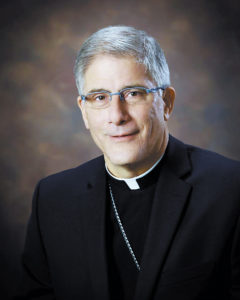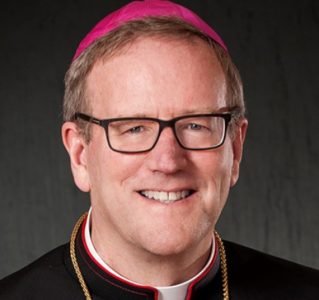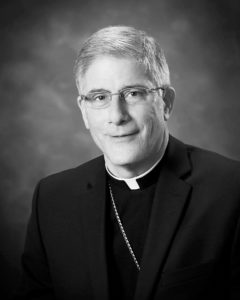By Bishop Joseph Kopacz

Bishop Kopacz
The preparatory document in anticipation of the 2018 World Wide Catholic Synod on Young People, The Faith, and Vocational Discernment recalls the steady progression of the dialogue that the Church is having with the modern world in the third millennium. The next few paragraphs from the preparatory document offer this context. “These things I have spoken to you, that my joy may be in you, and that your joy may be full” (Jn 15:11). This is God’s plan for all men and women in every age, including all the young men and women of the Third Millennium, without exception.
Proclaiming the joy of the Gospel is the mission entrusted by the Lord to his Church. The Synod on the New Evangelization and the Apostolic Exhortation Evangelii Gaudium treated how to accomplish this mission in today’s world. The two synods on the family and the Post-Synodal Apostolic Exhortation Amoris laetitia were, instead, dedicated to helping families find this joy. In keeping with this mission and introducing a new approach through a Synod with the topic, “Young People, the Faith and Vocational Discernment,” the Church has decided to examine herself on how she can lead young people to recognize and accept the call to the fullness of life and love, and to ask young people to help her in identifying the most effective ways to announce the Good News today. By listening to young people, the Church will once again hear the Lord speaking in today’s world. As in the days of Samuel (cf. 1 Sam 3:1-21) and Jeremiah (cf. Jer 1:4-10), young people know how to discern the signs of our times, indicated by the Spirit. Listening to their aspirations, the Church can glimpse the world which lies ahead and the paths the Church is called.”
This is an exciting undertaking and it represents the commitment of Pope Francis and the Church to further the dialogue, discernment, and direction of the Church in the modern world. It’s a dialogue within in the Church and beyond the Church. A recently published longitudinal study from the Center of Religion and Society from the University of Notre Dame offers a sobering yet hopeful reality on the transmission of faith from one generation to the next. They asked the poignant question, why is the loss of Catholic Identity so common in the United States?
They have a research-based perspective from which to propose an answer. “After looking closely at current and former Catholic young adults, we find causes for concern, and reasons for hope. On the one hand, many of them feel alienated from or suspicious of organized religion. Many think that religion violates the principles of science and logic. Many are simply more consumed with other things, like getting through school, spending time with friends, finding a romantic partner, getting a good job, and making ends meet. Many of them are resistant to the idea of doctrine or the suggestion that religion is anything more than a personal choice, like the kind of music one prefers. On the other hand, many formerly Catholic emerging adults still believe in and pray to God, and have a view of God not far from Catholic teaching. Many of them see value in the Church’s charity work and think religion is generally a good thing for society. Some are open to the idea of going back to the Church, particularly when they think about starting a family of their own… The Church needs to understand them in their particular place in life and to seek them out. Religion and faith are still evident in their stories, even if not in ways that the Church normally considers faithful.”
This entire process ahead will not be reinventing the wheel. It will be building upon the efforts of evangelization already at work with young people (ages 16-29) in our nation and wherever the Church is present, in families, in Catholic schools, religious education programs, and through a host of ministries for and with young people. In the United States the evangelization and catechetical efforts of Matthew Kelly and Dynamic Catholic, with a staff of 100 whose average age is mid to late 20s, have been a transforming energy in recent years in the church and in society.
Auxiliary Bishop Robert Barren of Los Angeles through his writing, preaching and teaching, and most recently through his Word on Fire project is focused especially on the work of evangelization in culture through the lens of nearly 2,000 years of wisdom and truth. Father Robert Spitzer, S.J., the former president of Gonzaga University, and now the Director of the Magis Institute in Irving California, has a strong commitment to reconciling faith with three critical areas that often push an openness to God to the margins: science, suffering and a life of virtue. CARA the Applied Center of Research in the Apostolate will also contribute mightily to this process leading to the Synod from their research on millennials.
The Diocese of Jackson will be engaged in this process during the preparatory phase and will be committed to studying and implementing the knowledge and understanding that emerge through the Synod and afterwards with the vision of Pope Francis. I think it is fitting to end this column with the words of two of our recently confirmed young people.
Their formation in the faith leading to the Sacrament of Confirmation reveals the power of God at work in their generation. “I want to be confirmed because I want to live better, to be closer to God, more mature in my faith and help others be closer to God” and “My love for service has increasingly grown throughout my Confirmation through my personal commitment to serve Christ and the Church. I am grateful and blessed to follow God’s mission for me.”
May we never tire of fighting the good fight of faith from one generation to the next knowing that the Lord is with us always until the end of time.
(To follow: Understanding Former Young Catholics)


